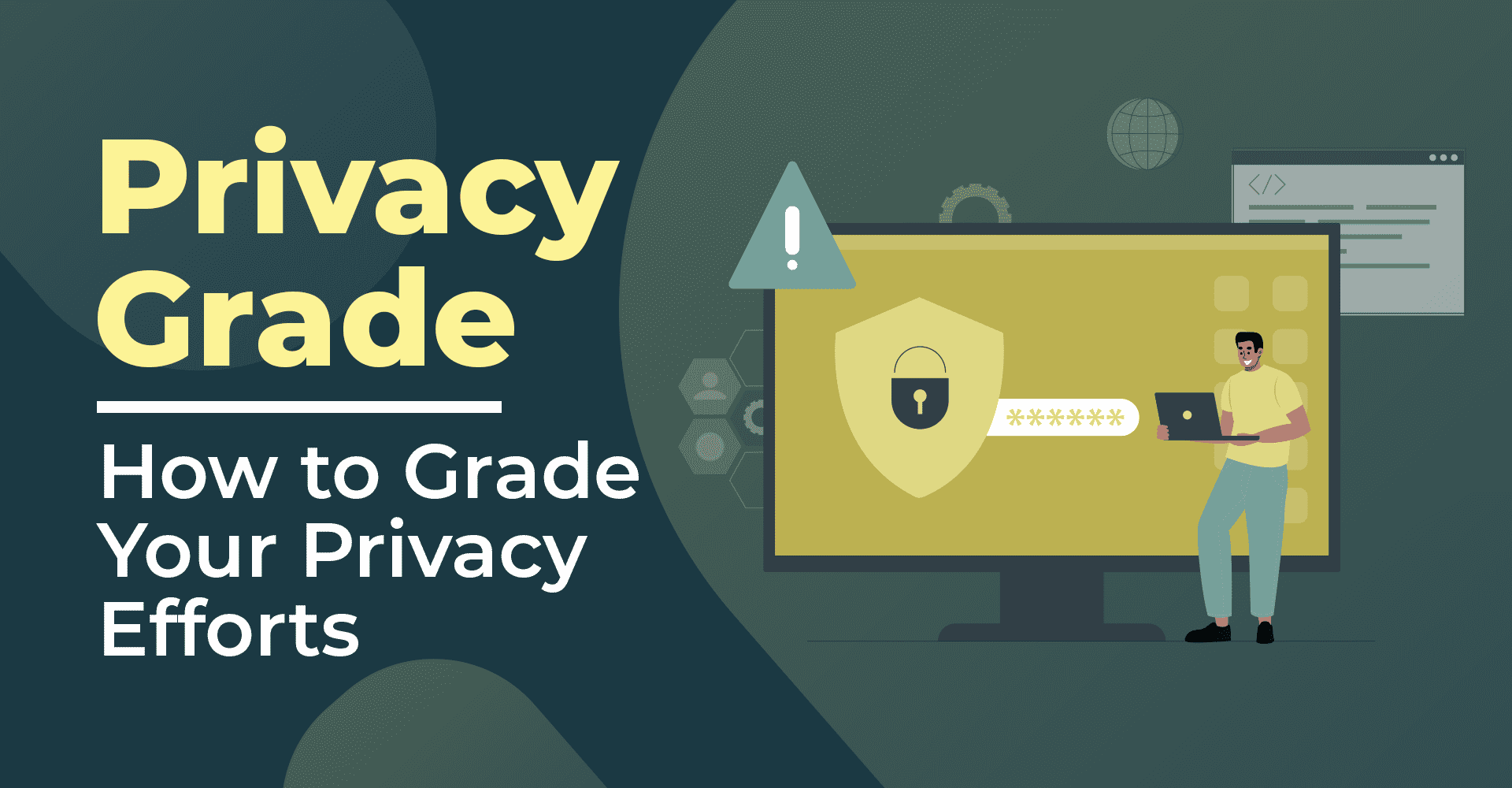Privacy Grade: How to Analyze & Improve Website Privacy

Table of Contents
As websites store more of our data, it’s more important than ever before for website users to know how their personal information is being handled. This is where a privacy grade comes in - it provides a simple way for users to assess how well a website protects their privacy.
In this blog post, we'll explain what privacy grade is, how to check a website's privacy grade, and what steps you can take to guard your privacy.
What is Privacy Grade and Why is It Important?
Privacy grade is a term that refers to the level of privacy protection that a website provides its users. This is often measured using a privacy grading system, which assigns a letter grade to a website based on its privacy policies and practices.
For example, a website that collects user data without user consent might receive a low privacy grade, while a website that only collects data that is necessary for its operations and provides clear and concise privacy policies might receive a higher grade.
Privacy grade is important because it allows website users to make informed decisions about which websites to trust with their personal information. By checking a website's privacy grade, users can quickly determine whether or not the website is taking appropriate measures to protect their privacy. This can help prevent identity theft, data breaches, and other privacy-related issues.
The Role of Privacy Grade in Website Security
Privacy grade plays a significant role in website security. It measures how well a website protects the privacy of its users and how securely it handles their personal information. A website with a high privacy grade ensures that user data is collected, used, and stored in compliance with data protection regulations.
Website privacy grades can vary widely, and some websites may not have any privacy rating at all. This is why it's crucial to check a website's privacy grade before sharing any personal information with it. It's also important to keep in mind that a website's privacy grade may change over time, so it's essential to stay vigilant and check it regularly.
How Do You Check a Website's Privacy Grade?
Checking a website's privacy grade is a simple process that can be done using a variety of online tools. One of the most popular tools for checking website privacy is Privacy Badger, a browser extension that analyzes website privacy practices and assigns a grade based on the results. Other tools include the Electronic Frontier Foundation's HTTPS Everywhere extension and Enzuzo’s Website Privacy Compliance Scanner.
Let's take a closer look at the tools.
1. Privacy Badger
To check a website's privacy using Privacy Badger, simply install the extension on your web browser and visit the website you want to check. Privacy Badger will analyze the website's privacy practices and assign a grade based on the results. The grades range from green (indicating good privacy practices) to yellow (indicating some privacy concerns) to red (indicating poor privacy practices).
2. HTTPS Everywhere
The EFF's HTTPS Everywhere extension works similarly to Privacy Badger, but it focuses specifically on website encryption. It ensures that your browser always uses a secure, encrypted connection when accessing a website, which helps protect your personal information from being intercepted by third parties.
3. Enzuzo’s Website Privacy Compliance Tool
For best results, we recommend that you start with Enzuzo’s website privacy analyzer tool. Simply input a URL and receive an overall ‘compliance score’, which tells you whether the website is compliant with data privacy laws.
Enzuzo’s tool highlights whether a website has a clearly defined privacy policy, terms of service, and cookie manager. This is an excellent method of determining a website's privacy grade. Enzuzo's built-in algorithms scan a website to find these pages. If they're unavailable or non-compliant, the tool sends a warning. This is helpful for users to understand whether a website actually has a privacy policy and adheres to it.
While the tools mentioned above can be extremely useful in assessing a website's privacy practices, they're not foolproof. It's important to read a website's privacy policy carefully and understand how it collects, uses, and shares your data.
What Can You Do to Guard Privacy?
While checking a website's privacy grade is an important step in protecting your online privacy, it's not the only step you should take. There are several other steps you can take to guard your privacy online:
Use a virtual private network (VPN): A VPN encrypts your internet connection and masks your IP address, making it more difficult for third parties to track your online activity.
Use strong passwords: Always use strong, unique passwords for your online accounts, and consider using a password manager to help you generate and remember them.
Be cautious about sharing personal information: Avoid sharing sensitive personal information (such as your social security number or credit card information) online unless it's absolutely necessary.
Check privacy policies: Always read a website's privacy policy before sharing any personal information, and avoid websites that don't provide clear and concise privacy policies.
Use privacy-focused search engines: Consider using privacy-focused search engines like DuckDuckGo or StartPage, which don't track your online activity or collect personal information.
Install security software: Install security software on your devices, such as antivirus software and firewalls, to protect against malware and other security threats.
Opt-out of data collection: Many websites allow users to opt-out of certain types of data collection. Look for the "Do Not Sell My Personal Information" or "Opt-out" options on websites you use regularly.
By following these steps, you can significantly reduce your risk of falling victim to online privacy breaches and other security threats.
How Companies Can Improve Their Privacy Grade
For companies, improving their privacy grade is essential to building and maintaining trust with their users. There are several ways that companies can improve their privacy grade:
Implement a clear and concise privacy policy: A privacy policy should clearly state how the company collects, uses, and shares user data.
Use secure data storage practices: Companies should use encryption and other security measures to protect and handle user data safely and securely.
Allow users to control their data: Companies should provide users with options to control how their data is collected, used, and shared.
Be transparent about data breaches: In the event of a data breach, companies should inform users promptly and transparently.
By implementing these best practices, companies can improve their privacy grade and build trust with their users.
The Future of Privacy Grade
As more people become aware of the importance of online privacy, privacy grade is likely to become a more prominent factor in website security. Governments around the world are implementing stricter data protection regulations, and companies that don't prioritize user privacy may face severe consequences.
Privacy grades play a crucial role in website security and is essential to protecting user privacy. By checking a website's privacy grade, users can assess how well their personal information is being handled by a website.
Tools like Privacy Badger and Enzuzo's Privacy Compliance Checker can help users assess a website's privacy practices, but it's important to read a website's privacy policy carefully. Companies can improve their privacy grade by implementing best practices like clear privacy policies, secure data storage practices, and user data control options. As online privacy continues to gain importance, privacy grade is likely to become an increasingly critical factor in website security.
For users, please always remember to read privacy policies, use strong passwords, be cautious about sharing personal information, and consider using privacy-focused search engines and security software. By taking these steps, you can ensure that your online privacy is protected and secure.
Want to learn how Enzuzo can help boost your privacy score? Book a demo today 👇

Osman Husain
Osman is the content lead at Enzuzo. He has a background in data privacy management via a two-year role at ExpressVPN and extensive freelance work with cybersecurity and blockchain companies. Osman also holds an MBA from the Toronto Metropolitan University.
